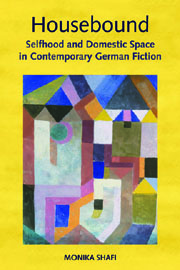Book contents
- Frontmatter
- Contents
- Acknowledgments
- List of Abbreviations
- Introduction
- 1 Bodies, Biographies, and Buildings: Jenny Erpenbeck's Heimsuchung and Katharina Hacker's Der Bademeister
- 2 House Inheritance: Arno Geiger's Esgeht uns gut and Katharina Hagena' Der Geschmack von Apfelkernen
- 3 Escaping to the Countryside: Walter Kappacher's Selina oder Das andere Leben and Monika Maron's Endmoränen
- 4 Uncanny Houses: Select Narratives by Judith Hermann, and Susanne Fischer's Die Platzanweiserin
- 5 Open Houses: Emine Sevgi Özdamar's “Der Hof im Spiegel” and Seltsame Sterne starren zur Erde: Wedding-Pankow 1976/77
- 6 (Un)safe Houses: Katharina Hacker's Die Habenichtse and Ian McEwan's Saturday
- Conclusion
- Bibliography
- Index
6 - (Un)safe Houses: Katharina Hacker's Die Habenichtse and Ian McEwan's Saturday
Published online by Cambridge University Press: 05 February 2013
- Frontmatter
- Contents
- Acknowledgments
- List of Abbreviations
- Introduction
- 1 Bodies, Biographies, and Buildings: Jenny Erpenbeck's Heimsuchung and Katharina Hacker's Der Bademeister
- 2 House Inheritance: Arno Geiger's Esgeht uns gut and Katharina Hagena' Der Geschmack von Apfelkernen
- 3 Escaping to the Countryside: Walter Kappacher's Selina oder Das andere Leben and Monika Maron's Endmoränen
- 4 Uncanny Houses: Select Narratives by Judith Hermann, and Susanne Fischer's Die Platzanweiserin
- 5 Open Houses: Emine Sevgi Özdamar's “Der Hof im Spiegel” and Seltsame Sterne starren zur Erde: Wedding-Pankow 1976/77
- 6 (Un)safe Houses: Katharina Hacker's Die Habenichtse and Ian McEwan's Saturday
- Conclusion
- Bibliography
- Index
Summary
In Bertolt Brecht'sDie Dreigroschenoper (1928), Jonathan Jeremiah Peachum, owner of the firm “Beggar's Friend,” tells the beggars who have to work for him that he has figured out how to profit from their poverty. Contrasting their meekness and suffering to his entrepreneurial skills, he boasts:
Aber ich habe herausgebracht, daß die Besitzenden der Erde das Elend zwar anstiften können, aber sehen können sie das Elend nicht. Denn es sind Schwächlinge und Dummköpfe, genau wie ihr. Wenn sie gleich zu fressen haben bis zum Ende ihrer Tage und ihren Fußboden mit Butter einschmieren können, daß auch die Brosamen, die von den Tischen fallen, noch fett werden, so können sie doch nicht mit Gleichmut einen Mann sehen, der vor Hunger umfällt, freilich muß es vor ihrem Haus sein, daß er umfällt.
[And I did work out something: that the rich of the earth indeed create misery, but they cannot bear to see it. They are weaklings and fools just like you. As long as they have enough to eat and can grease their floors with butter so that even the crumbs that fall from their tables grow fat, they can't look with indifference on a man collapsing from hunger — although, of course, it must be in front of their house that he collapses.]
- Type
- Chapter
- Information
- HouseboundSelfhood and Domestic Space in Contemporary German Fiction, pp. 169 - 194Publisher: Boydell & BrewerPrint publication year: 2012



